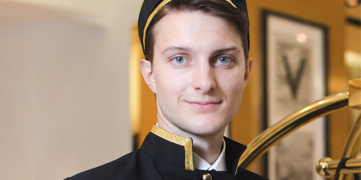Passers-by Pera Palace Hotel: King Pierre of Serbia

Image Source: https://www.modamuzayede.com/urun/1085001/kartpostal-sirbistan-krali-i-s-m-pierre
Pera Palace Hotel, one of the rare structures that have survived from 19th century Istanbul, has the title of being the first hotel of Turkey by European standards, as well as carrying traces of the Istanbul of the 1800s in its architectural understanding. With its splendor, comfort, and view that offers a panorama of the Haliç, it opened its doors to well-known names such as Mustafa Kemal Atatürk, Agatha Christie, Ernest Hemingway, Umberto Eco, Mark Twain, and Arthur Conan Doyle. One of the passers-by from Pera Palace Hotel is Serbian King Pierre…
Years Away From the Kingdom
King Pierre was born as the son of Prince Alexander Karadordevic. He was also the grandson of Karadorde, the leader of the First Serbian Uprising, and the founder of the Karadordevic dynasty. He was born in a merchant’s house as the Royal Palace was under renovation. This, in fact, was a kind of destiny for him, a harbinger of years away from the kingdom. Pierre, the third son of the family, was not a direct heir to the kingdom. However, the death of both of Pierre’s older brothers when Pierre was a child would make him an heir.
Pierre was preparing to go to Geneva for high school after spending his childhood in Belgrade. In those years, Pierre’s father had to abdicate. Thus, the kingdom passed to the Obrenovic family. Pierre, after completing his high school education in Geneva, enrolled first at the College Sainte-Barbe and then at Saint-Cyr, the most respected military school in France. Continuing to live in Paris after finishing his education, Pierre was gaining new pleasures and interests. He was closely interested in painting and photography while working on political philosophy. He was especially working on liberalism, parliamentarism, and democracy. In fact, he seemed to be preparing to become king at that time.
The Road From Guerrilla Activities to the Throne
During the years Pierre was in France, the Franco-Prussian War broke out. Pierre joined the French Foreign Legion with the rank of lieutenant but was captured shortly thereafter. After he managed to escape from captivity, he returned to the front. In the spring of 1871, he joined the Paris Commune. When the calendar leaves showed the year 1875, the guerrilla years began, which would last until 1878.
When Pierre went to Dubica, Bosnia in 1875, he received a cold welcome. His initial plan had failed when Serbian Prince Milan discovered that Pierre was attempting to reclaim the kingdom from the Obrenović dynasty. Pierre and his followers had to leave Bosnia and withdraw to Austria-Hungary. However, there they got arrested. Having managed to escape captivity once again, Pierre returned to Bosnia and again aroused his suspicions by organizing another rebel gang. It was even labeled as a separatist for this reason. He left Bosnia for the second time to find peace. He left behind a letter explaining that he wanted to make peace with the Obrenovic Dynasty.
Pierre, whose peaceful attempts did not end with any results, was accused of collaborating with the Ottoman Empire and of treason. After staying in the mountains for a while, he managed to lose track of himself and then moved on to Austria-Hungary. Pierre, who was arrested again there, was held in the Karadordevic family’s home in Bokszeg. In 1878, he was allowed to leave Bokszeg. Pierre was followed by Austro-Hungarian spies until he crossed from Budapest to Paris. Pierre, who was convicted in absentia in the trial brought by Prince Milan in 1879, was accused of treason and sentenced to death.
A Game-Changing King
The year was 1903. In the intervening years, Pierre married the daughter of Prince Nicholas, the ruler of Montenegro, had three children and lost his wife in 1890. Deciding to devote his life to his children, Pierre’s fate was written outside of his own administration. The soldiers decided to put Pierre on the throne by killing the Obrenovic Dynasty that held the kingdom. Pierre had only one condition to accept this offer: if approved by the National Assembly, he would ascend to the throne. On June 10, 1903, the entire Obrenovic family was killed. This also brought an end to the feud between the Karadordevic and Obrenovic families. The National Assembly summoned Pierre five days later to assume the Serbian throne.
King Pierre, who witnessed the Balkan Wars throughout his kingdom, displayed a game-changing attitude. Unlike the Obrenovic family, he had good relations with Russia and France. He opposed the Balkan policies advocated by the Austrians and Germans. King Pierre, who invested in the defense of his country, reaped the fruits of this attitude in the Balkan Wars. Thus, it brought prestige to Serbia on a global scale.
Adopting the parliamentary system, the king became one of the biggest supporters of political freedoms. While laying the foundations for modernization, it supported a cultural proliferation for all Serbs, Croats, and Slovenes in the Balkans. During King Pierre’s reign, Serbia’s democracy has been boosted in the Balkans. King Pierre, who also took care of his relations with the Ottoman Empire, visited Sultan Mehmed V Reşad in 1910. During this visit, he stayed at Pera Palace Hotel during his stay in Istanbul. He passed away in 1921 at the age of 77.


